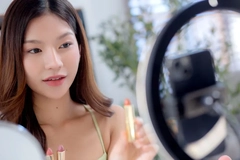
04 Mar 2021 --- Experts from Whole Foods Market’s Trends Council have unveiled the top five clean beauty trends for 2021.
As consumers increasingly turn to simple and natural ingredients, the clean beauty trend is intensifying, from beauty products that cut back on water to those that hold double functions, the retailer says.
The five trends are Beauty Goes Waterless, Multitasking Balms, Juiced-Up Skin Care, Upcycled Beauty and Stressed Skin, and Meet Ramped-Up Remedies.
“The beauty industry has seen significant consumer shifts this year due to COVID-19, and our trends are a true reflection of these changes,” says Amy Jargo, global beauty buyer at Whole Foods Market.
“Customers are looking to streamline their beauty routines, while also seeking out brands that align with their values like those that limit their environmental impact with waterless and upcycled products.”

Juiced-up skin care
According to Whole Foods’ experts, juicing fruits and veggies isn’t the only way to incorporate more of them in your daily routine.
New skincare and self-care essentials are making industry rethink how to take full advantage of top superfoods. From celery and mushrooms to blueberries, these go-to ingredients for juices, smoothies and salads could help skin appear brighter and firmer.
Upcycled ingredients aren’t just showing up in food, but also in beauty products. Recognizing this, Givaudan Active Beauty launched a cosmetic ingredient created from wild bilberries called Omegablue, which boasts “advanced skin repair” properties.
Moreover, Givaudan is tapping into the potential of nootropics’ cosmetic properties by unveiling a line of six botanical extracts that benefit the skin, such as guarana, ginger, green tea, gotu kola, Ginkgo biloba and green coffee.
Beauty goes waterless
Hydration without packaging waste is an accelerating trend as eco-conscious consumers seek to minimize their impact on the planet.
Many beauty products are being packaged in solid, waterless formats to help minimize the use of plastic packaging.
When a product isn’t in liquid form, brands can use materials such as recyclable boxes or metal tins, and the product is generally smaller, reducing the amount of packaging needed and the shipping weight.
There are already shampoo and conditioner bars that have let go of excess packaging, as well as toothpaste tablets that whiten and brush away plaque while doing good for the environment.
In this space, L’Oréal’s Garnier brand relaunched its Ultra Doux line of shampoos, which now comes in a solid bar format, in recyclable and FSC-certified cardboard packaging.
Multitasking balms
Multitasking balms are another trend that Whole Foods spotlights. Balms are being reimagined to cater to many areas with skin concerns such as lips, cheeks and cuticles.
 New skin care essentials are making industry rethink how to take full advantage of superfoods. These moisturizers are packed with ingredients like shea butter, coconut oil and sunflower seed oil.
New skin care essentials are making industry rethink how to take full advantage of superfoods. These moisturizers are packed with ingredients like shea butter, coconut oil and sunflower seed oil.
Tapping into both multitasking and zero packaging, US-based Eco Lips is launching a plastic-free, 100 percent plant-based tube pod for lip balm formulations, dubbed PlantPod.
Upcycled beauty
Upcycled products aren’t just showing up in food, but Whole Foods says it is seeing repurposed ingredients pop up in beauty products as well. Coffee grounds, apricot stones and argan shells are all ingredients that support the skin, while giving what would have been food waste, new life.
True to this, Givaudan unveiled Koffee’Up last year, a science-backed premium coffee oil, crafted using upcycling techniques. The ingredient is hailed as the “new argan oil” for the beauty industry and was developed in collaboration with Danish start-up company Kaffe Bueno and is touted as being all-natural.
Stressed skin meets ramped-up remedies
Stress isn’t great for the skin and neither is months of wearing a face mask, says Whole Foods, with “maskne” being the latest skin health concern.
Clean beauty remedies have introduced new formats like masks and serums with soothing ingredients like tea tree oil and witch hazel extract to combat acne that can result from face mask use.
Whole Foods Market’s standards go beyond typical “clean beauty” claims, the retailer says.
“We ban more than 100 ingredients, including parabens, phthalates, microbeads and triclosan, from all beauty and body care products we sell.”
Additionally, Whole Foods Market requires third-party certification for organic label claims on personal care products, as there are no mandatory government standards for “organic” claims on body care products.
By Kristiana Lalou













